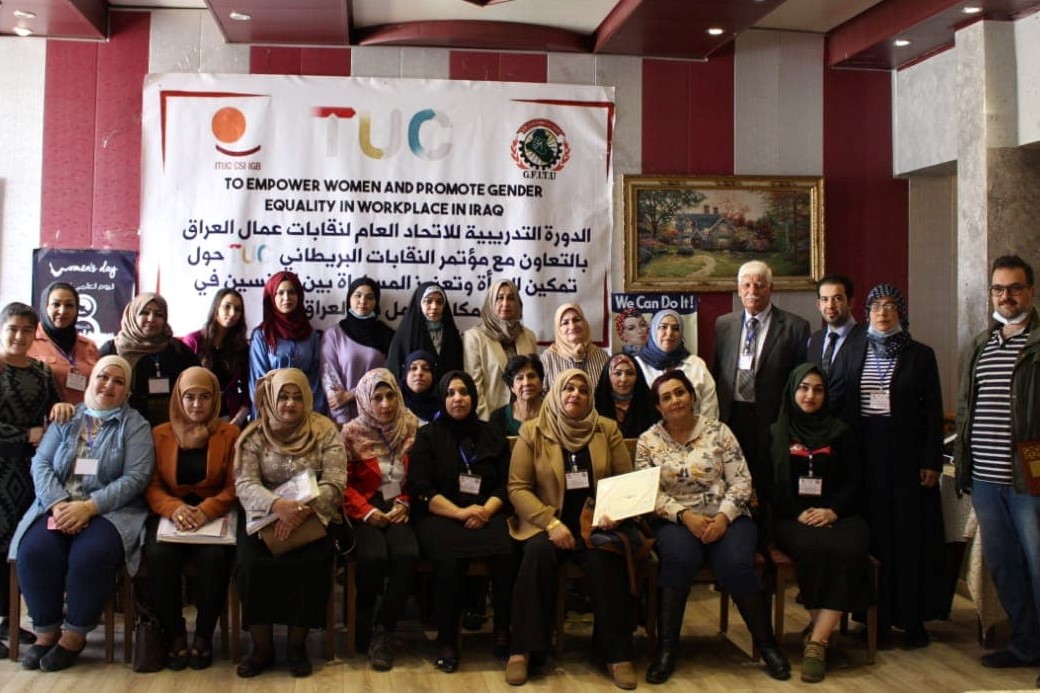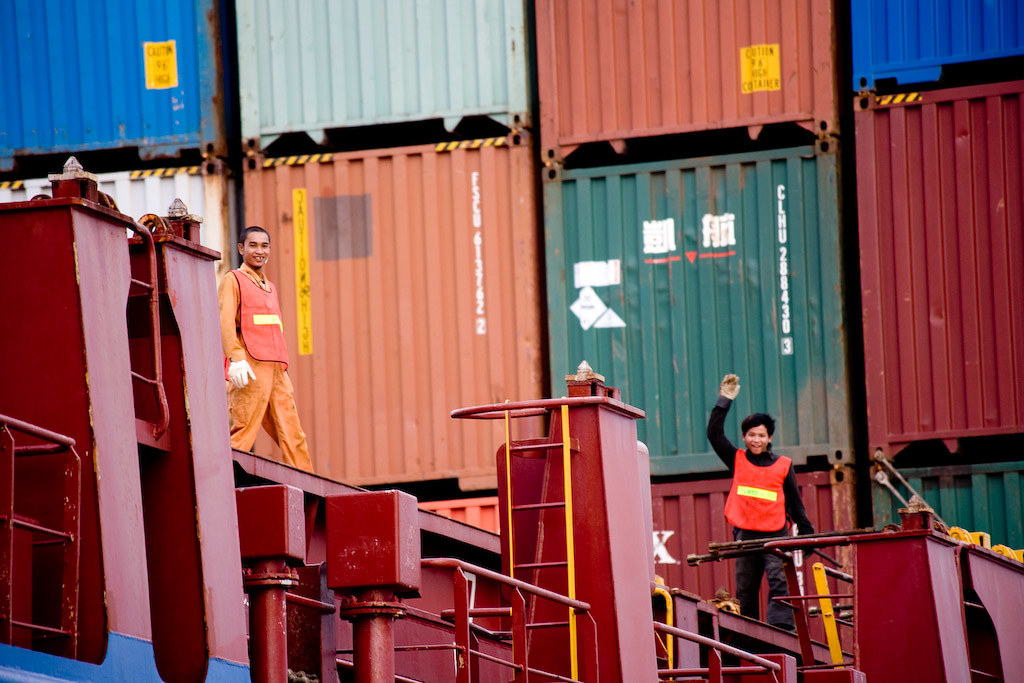Standing with workers everywhere for decent work and social justice
We’re calling on the UK government to:
- Collaborate to ensure free, transparent and universal access to vaccines, testing and treatment – through WHO leadership, and support WTO suspension of the agreement on intellectual property rights – TRIPS,.
- Support decent work for all (respect for rights at work; full and productive employment; social protection and social dialogue) working closely with trade unions to achieve this and other SDGs.
- Help strengthen gender-responsive, quality public services in the Global South that are publicly owned and funded - underpinned by decent work.
- Build the capacity of trade unions in the Global South to organise workers and bargain collectively for better pay and conditions, including addressing inequalities.
- Support a Global Fund for Social Protection
- Support debt relief and cancellation, and an internationally agreed mechanism to deliver debt sustainability.
- Work with partner governments and trade unions to deliver a Just Transition and tackle the climate crisis.
- Support democratic reform of the World Bank and International Monetary Fund (IMF) with policies aligned to meeting the UN Sustainable Development Goals, and respect for international labour standards and human rights.
- Agree to a financial transaction tax and work towards a G20 Inclusive Framework on Base Erosion and Profit Shifting agreement, including a robust minimum tax floor.
- Reverse the damaging aid cuts and return to 0.7%.
Decent work for all is a global struggle
Our struggle for decent work and an end to poverty and inequality is a global struggle. The coronavirus pandemic has exposed historical structural inequalities with their negative impacts in the Global South on access to quality healthcare and other public services, on the ability of governments to protect jobs and livelihoods, and on access to social protection and vaccines. Together with trade unions in the Global South, we’re calling for decent work to be at the heart of development with workers having a say in policy making, to secure an inclusive and sustainable recovery. Decent work for all is key to achieving the UN’s Sustainable Development Goals. Building workers’ collective power globally will help reshape globalization so that it delivers in the interests of workers everywhere.
What are the issues?
“Workers’ rights are human rights and respect for workers’ rights and compliance with labour standards are the foundations of decent work and social justice.”(ILO, 2019)
Governments around the world have promoted neoliberal globalisation – increasing corporate wealth and power, and a race to the bottom on workers’ pay, terms and conditions. It can’t be right that the bottom half of the global population owned less that 1 per cent of all wealth in 2018, while the richest top 10 per cent owned 85 per cent. The share of wages as a proportion of national income fell in 91 out of 133 countries from 1995 to 2014, according to the ILO (2016).
Historical structural inequalities persist – disadvantaging low and middle-income countries. Rich countries still have more say in the global institutions that set the rules – like the International Monetary Fund (IMF), World Bank and World Trade Organisation (WTO). The Bank and Fund continue to promote a model of development that has weakened workers’ rights and promoted austerity.
Around the world, about 630 million workers still live in extreme or moderate poverty, and about two billion work informally – with few legal protections and little access to social security. Women are more disadvantaged – often overrepresented in sectors and jobs that are more precarious, valued less and that pay less. The gender wage gap stands on average at 23 per cent.
The pandemic has also exposed the flaws in social protection systems and highlighted the need to build resilient systems with universal access. This is why the TUC as part of the global trade union movement supports a Global Fund for Social Protection.
Universal access to gender-responsive public services that are publicly funded and delivered - underpinned by decent work, is vital to ending poverty and inequality, tackling the pandemic and building an inclusive recovery. Yet, in 2018, at least 46 low-income countries spent a greater share of GDP on debt servicing than on healthcare systems. The Bank and Fund supported by the UK government, continue to promote privatisation of public services in the Global South despite evidence that this does not deliver in the interests of poorer people.
Although the IMF has supported debt relief for some countries affected by the pandemic, a more sustainable solution is needed. And at a time when many low and middle-income countries need more support, not less, the UK government has regressively cut aid from 0.7 per cent of national income to 0.5 per cent. UK aid should be targeted at reducing poverty and inequality and meeting the SDGs including decent work for all by 2030 (Goal 8) – with transparent outcomes and consistent trade union engagement. But we’re concerned that the government’s strategic shift in aid spending will increasingly focus on supporting national self-interests.
The loss in UK aid is combined with developing countries losing an estimated $50-200 billion a year due to activities like profit shifting by multinational companies in order to avoid paying tax. This too robs developing countries of much needed resources to invest in quality public services, infrastructure and decent job creation.
The inequitable access to coronavirus vaccines we are seeing mirrors structural global inequalities. But, the public good must prevail over the interests of big pharmaceutical corporations. We need free, transparent and universal access to vaccines, testing, and treatment (globally through WHO leadership and through WTO suspension of the agreement on intellectual property rights – TRIPS).
And, we are facing a climate crisis. According to the OECD, poor people and poor countries will bear the brunt of climate change. UNA-UK contends that climate change amplifies existing gender inequalities. No one should be left behind as countries transition to low-carbon economies, and social dialogue is key to ensuring a Just Transition.
Our roleThe TUC has a strong track record of working on international development. We advocate for an approach based on respect for human rights and international labour standards, equality, decent work for all, and support for peace and democracy. Through TUC Aid, the TUC supports a range of projects to build trade union capacity and promote equalities working with sister centres, global unions and NGOs. Decent work for all is included in Goal 8 of the UN Sustainable Development Goals and the ILO’s Decent Work Agenda defines it as:
|
Decent work sums up the aspirations of people in their working lives. It involves opportunities for work that is productive and delivers a fair income, security in the workplace and social protection for families, better prospects for personal development and social integration, freedom for people to express their concerns, organize and participate in the decisions that affect their lives and equality of opportunity and treatment for all women and men.


